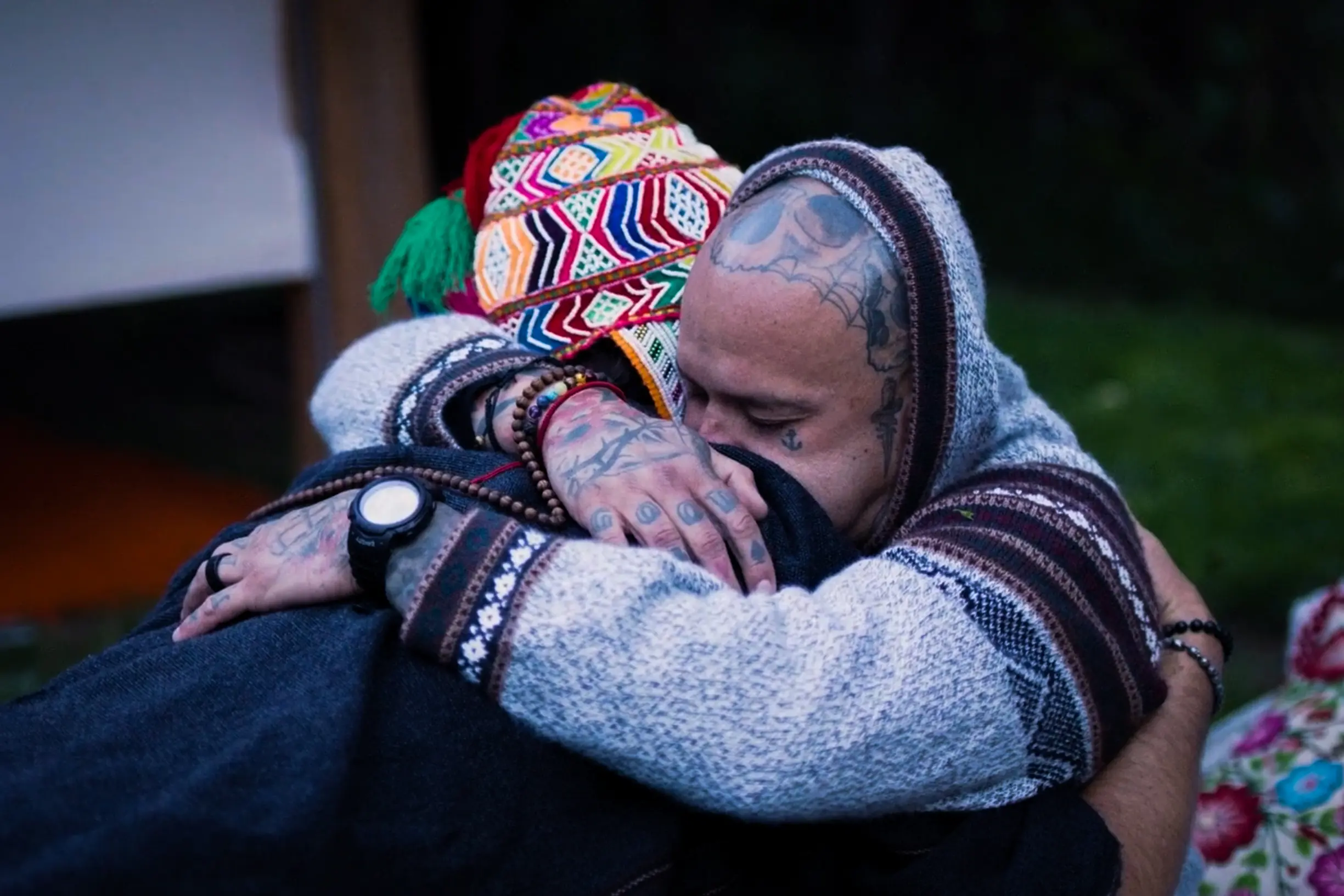After five years of paranoia so debilitating that he’d linger by the window, waiting for someone to bust into his home, Gabriel Martin finally had hope for a cure. But if he wanted a chance at it, he only had 24 hours to come up with $800.
Just four days prior, Martin had applied to Heroic Hearts, a nonprofit that sends veterans to the Amazon to drink ayahuasca. He’d told them about his story—four combat tours in the Middle East and a bronze star in Baghdad. As is often the case with Heroic Hearts scholarships, at the last minute a spot had opened up at Arkana Spiritual Center in Peru, so the nonprofit’s founder, Jesse Gould, had emailed him.
“You have to commit to it now, there’s no backing out, and you have to pay for your plane ticket,” Martin recalls the message saying.
The 24-day retreat, which typically costs $2480.00, would be free, but the flight cost $1600—almost as much as Martin’s monthly retirement check from the military. There was no way.
Martin wrote to Heroic Hearts. The most they could do was subsidize half the flight, so he sold the only thing he could in such a quick turnaround: his 9 millimeter semi-automatic Glock pistol, which he kept in the house for security. Two and a half weeks later, he was in the jungle.
Martin’s financial situation is a common one, says Jesse Gould, founder of Heroic Hearts. The nonprofit, founded in April 2017, currently has a waitlist of around 150 veterans, most of whom have tried the standard treatments for PTSD and, amid desperation, are seeking something else. Of the 150 people on that waitlist, says Gould, five can pay the estimated $3000 cost of the trip in full, around 20 can pay for part of it, and the rest need complete financial assistance to get to the Amazon.
“It’s tough because a lot of times the people who have mental health issues are also the people who are most financially restricted,” says Gould. “There are very few people with savings who can afford to throw down three, four grand.”

This problem isn’t unique to the veteran community. Ayahuasca ceremonies—whether in the United States or abroad—tend to be prohibitively expensive. In the U.S., the average underground ceremony costs about $200 to $250 per night. Ceremony leaders typically recommend that people sit in two or three ceremonies, on consecutive nights, putting the cost of one weekend at at least $400 or $500.
How to Grow Shrooms Bundle
Take Both of Our Courses and Save $90!
Most of the legal ayahuasca retreat centers in Latin America are in Costa Rica, Colombia and Peru. They typically last seven, ten, fourteen days, or even longer with four or more ceremonies interspersed throughout the evenings. The cost of retreats at well-known centers—like Soltara Healing Center and Rythmia in Costa Rica and the Temple of the Way of the Light in Peru—vary depending on the type of room a person chooses. It’s common, though, for people to pay at least $1500 or $2000 to drink ayahuasca. That puts their total cost, after flights, at at least $3000, not including the time a person has to take off work for the experience itself or afterwards, if they want extra time to process their trip upon returning home.
It may seem like a lot of money—and it is for the average American, who makes $32,000 a year—but Bia Labate, founder of the Chacruna Institute for Plant Medicines, Jeremy Narby, anthropologist and author of “The Cosmic Serpent: DNA and the Origins of Knowledge,” and other experts say, for the most part, shamans and retreat centers are not getting rich off the ayahuasca trade. It requires a lot to run a retreat center properly, they say: the upkeep of the land and facilities, a salary for the employees (both those who facilitate the ceremonies and who work elsewhere on the property), not to mention the years of expertise and training required for a shaman who really knows what they’re doing.
“They’re not buying pink Rolls Royces,” says Narby. “They’re providing jobs for 15 or 20 people, they’re running kind of a small hotel. They always need more money, it’s like a bottomless hole.”
Echoing that sentiment, Labate says the retreat center business in South America has become even more challenging in recent years with the growing competition. The Temple of the Way of Light, one of the most well-known, reputable retreat centers, has a regular support staff of 70 people and provides work for more than 100 people, in total, mostly from three local villages (Tres Unidos, San Pedro and San Pablo de Cuyana) in the Peruvian Amazon. They work with healers from the Shipibo tribe, who make the ayahuasca brew and conduct the ceremonies. They also staff yoga teachers, meditation teachers, and integration therapists to provide support on-site, and review people’s mental health history and medications prior to booking their reservation.
But that doesn’t change the fact that ayahuasca—and psychedelic-assisted psychotherapy in general, for that matter—remains inaccessible to large numbers of people who might benefit from it. In the case of ayahuasca, this can lead to people participating in ceremonies with what Narby calls “fly-by night shamans”—people who aren’t formally trained in administering the medicine.
That’s what’s happening in Oklahoma, where Martin lives. A growing number of ayahuasca ceremonies are popping up, he says, in tents in the woods outside his “podunk town.” “I’m in the heart of the Bible Belt,” he says. “People know [ayahuasca] is expensive and they know that your average blue-collar worker can’t just get $4000 and say goodbye to their family for two weeks to do this, so we gotta live in the shadows and go through word of mouth.”
Ceremonies in this context can average $100 per night, Martin says, and he doesn’t blame people for doing ayahuasca this way. If it has the ability to change their life, he says, who is he to judge them for not having “the proper guides” and icaros (traditional songs)?
“People know [ayahuasca] is expensive and they know that your average blue-collar worker can’t just get $4000 and say goodbye to their family for two weeks”
Experts in the field of psychedelics, however, widely agree that it’s important to drink ayahuasca somewhere safe and reputable—whether that’s with a nonindigenous ceremony leader in the States, an indigenous shaman visiting the U.S. from Latin America, or at a retreat center abroad. With the globalization of ayahuasca in the last five to ten years, a growing number of reports have detailed people sitting in ceremonies where they simply don’t feel supported. In some cases, people have been sexually assaulted by ceremony leaders, too.
Ismail Ali, policy and advocacy counsel at the Multidisciplinary Association of Psychedelic Studies (MAPS), says that part of the problem is simply the illegality of ayahuasca and psychedelics at-large. If ayahuasca were legal for medical use, says Ali, there could be a patient assistance program to subsidize the cost of it, the way there is for a number of other medications. But the U.S. is nowhere close to that. Thus far, there’s only been one promising, but small, double-blind randomized clinical trial on ayahuasca out of Brazil.
There are some underground practitioners providing low-cost or free ceremonies for people of color. (The psychedelic community is notoriously white despite the disproportionate rates of trauma and other mental health conditions among people of color in the U.S.) Sometimes, says Ali, people also just pay for other people to sit in ceremony, but these are one-off cases of generosity.
At this time, however, the risk is just too high for underground practitioners to do anything more visible and official. There are only two organizations that have been granted the religious right to use ayahuasca in the United States: the Santo Daime and the União do Vegetal (UDV) churches. Otherwise, the dozens of ayahuasca ceremonies happening each weekend, from Los Angeles to New York, are completely underground. And it’s not easy work.
Ceremony leaders need to get the ayahuasca, transport it, find a place to hold the ceremony, and connect with locals in each city to help coordinate, among other logistics. Labate says it may seem as though they’re profiting significantly, but there’s a lot of expenses involved in this itinerant lifestyle, including the cost of transportation and accommodation. There’s not usually a regular customer base, either, as most people tend to drink ayahuasca rarely and ceremonies constantly have to be filled with different people, typically at least around eight.
Labate suggests the legal ayahuasca churches in the U.S. are a more sustainable model. Rather than starting from scratch every time in a new location with a new group of people, these churches, like other religious organizations, drink ayahuasca together permanently and share in the costs. The Santo Daime church in San Francisco, for example, charges $75 per ceremony. There’s also the possibility of legal retreat centers abroad implementing some kind of subsidy program.
Rythmia, a retreat center in Costa Rica, known for its high-end accommodations, has already comped a couple hundred flights to their center. Amid all the need, they’re planning to roll out a more official scholarship program, with the aim of eventually paying for half the ayahuasca ceremonies they do in full. Arkana and the Temple of the Way of the Light, too, are already subsidizing some ceremonies.
Jesse Gould says they can’t help everyone fast enough though. Every time he goes on a podcast or does some other media engagement, Heroic Hearts gets at most $100 or $200 in donations, but ten to fifteen more applicants. Ultimately, he says, the problem is much larger than ayahuasca—it’s about the neglect of the VA and the health care system at-large to effectively treat mental health conditions in the U.S.
How to Grow Shrooms Bundle
Take Both of Our Courses and Save $90!
Since coming back from the Amazon, Martin’s life has transformed. His rage—once unpredictable—has disappeared. His wife, who less than a year ago was about to give up on him, has now become a yoga instructor and reiki master. She massages his back to ease his chronic pain and they’ve just put their house in Oklahoma up for sale, with the dream of caravanning around the U.S. in an RV and doing yoga on the beach. “She wants to do yoga on Shell Beach in California and walk around with no shoes on,” he chuckles.
Martin launched a YouTube channel advocating for plant medicines and walks around, many days, proudly sporting his DMT and ayahuasca shirts. “I’m just hoping someone’s gonna say, ‘Hey what’s that?’” he says. But, he knows, most of the folks where he lives will never get to experience what he did.
To donate to Heroic Hearts, visit their website.
Shelby Hartman is DoubleBlind’s Co-founder and Editor-in-Chief.

DoubleBlind is a trusted resource for news, evidence-based education, and reporting on psychedelics. We work with leading medical professionals, scientific researchers, journalists, mycologists, indigenous stewards, and cultural pioneers. Read about our editorial policy and fact-checking process here.

DoubleBlind Magazine does not encourage or condone any illegal activities, including but not limited to the use of illegal substances. We do not provide mental health, clinical, or medical services. We are not a substitute for medical, psychological, or psychiatric diagnosis, treatment, or advice. If you are in a crisis or if you or any other person may be in danger or experiencing a mental health emergency, immediately call 911 or your local emergency resources. If you are considering suicide, please call 988 to connect with the National Suicide Prevention Lifeline.



